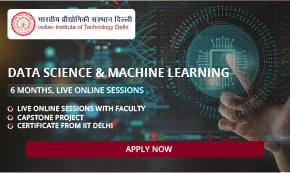5 Incorrect Phrases That Could Ruin Your Data Science Interview

- Incorrect Phrase 1: Logistic Regression is a Classification Algorithm, And Surely Not a Regression!
- Incorrect Phrase 2: ‘P-Value’ Is The Opportunity To Get a Result By Pure Coincidence
- Incorrect Phrase 3: Trying Every Model on The Data And Selecting One Depending On The Accuracy Metrics Is Your Data Modelling Strategy
- Incorrect Phrase 4: Your Approach To Handle Oddity or Deviation Is To Discard Them To Get Adjusted Into the Curve Seamlessly
- Incorrect Phrase 5: Stepwise Regression Is Among The Many Forms of Regression
Data Science is one of the most promising careers in today’s IoT world, and its interviews are indeed clumsy. Getting rejected on the first few interviews is just the beginning. Although coursework, training, skills, and an academic degree are crucial to crack a job in this field, they aren’t enough to guarantee a job.
When you sit on data science interviews, the company can find plenty of reasons to reject your application. Obviously, they won’t reject a good candidate with proper interview skills, and that’s what you need to focus on.
If you’re about to give a data science shortly, there are a few things you should avoid saying or expressing during the interview, as they might ruin things for you. Here are the five things to avoid saying during the interview:
Incorrect Phrase 1: Logistic Regression is a Classification Algorithm, And Surely Not a Regression!
You’ll find that several people have plenty of misunderstandings regarding logistic regression. According to several data scientists worldwide, the word ‘regression’ used in logistic regression is an inappropriate or wrong use of the name.
One can use logistic regression for the purpose of regression. And as a matter of fact, one can use logistic regression without requiring to place whimsical cut-off points.
Considering logistic regression as one of the classification algorithms while thinking it could be used only for ‘classification’ purpose is similar to an individual holding a gun on his head without knowing that the trigger is on.
Incorrect Phrase 2: ‘P-Value’ Is The Opportunity To Get a Result By Pure Coincidence
According to a research paper, it is revealed that the breach of frequently unstated analysis protocols (such as determining analyses for a PowerPoint presentation depending on the P values produced as the result) can result in small P values, no matter if the announced test theorem is right. It can also result in larger P values, even if the theorem is wrong.
Incorrect Phrase 3: Trying Every Model on The Data And Selecting One Depending On The Accuracy Metrics Is Your Data Modelling Strategy
When you try all the data models without even checking and selecting one depending on the accuracy metrics, you’re wrong. You’re merely toying with the system and not doing data science.
Furthermore, if you feel empty-minded while deciding which variables to choose for your data model, it’s more likely that you’ll feel the same once you choose variables via the ML/stat methodology. It will do nothing good for you and the company.
It’s imperative to understand that applied data science is not some place to experiment with things. Businesses will expect results from your side when they hire you. You should know what you’re doing, and prerequisite knowledge of statistics and maths can immensely help.
Although you’re not a ‘scientist’ in the true sense, you should at least do justice to the word used in ‘data science.’ You can follow these techniques to make the most out of the profession:
- You must pick features directed by the domain knowledge. If not, at least communicate with the domain experts concerning feature selection.
- You should envisage and delve into deep thinking to resolve any problem vigorously.
- Know and understand the merits and drawbacks of implementing a technique or algorithm to data.
AI has emerged as a multi-billion dollar industry, and it couldn’t have been possible if data science wasn’t done correctly.
Incorrect Phrase 4: Your Approach To Handle Oddity or Deviation Is To Discard Them To Get Adjusted Into the Curve Seamlessly
“Embrace oddity, deviation, and inequality,” says Adrian Olszewski – a principal biostatistician at 2KMM CRO. Adrian pointed out and quoted the Flint Water Crisis, saying that we must scrutinize them, no matter if they are just errors.
This project turned out to be a disaster as individuals avoided the unusual lead concentration in the water, which resulted in the death of many people. It doesn’t imply that you should avoid cleaning your data. It means that you should avoid doing things without any proper method and actual understanding.
Incorrect Phrase 5: Stepwise Regression Is Among The Many Forms of Regression
A ceaseless regression model development in a step-by-step manner is referred to as stepwise regression. It involves choosing separate and distinct variables, which you can further utilize in the final model. The stepwise regression incorporates the inclusion and removal of probable explanatory variables in progression.
Final Words
The surging demand for data science professionals is a golden opportunity for people to outshine in this field. Plus, the high pay scale is the icing on the cake. If you aspire to explore this field and make a good career here, the best way to get started is Emeritus India.
Their latest, revised, and ‘next-level’ professional data science courses will surely direct you in the right career and prepare you for the upcoming professional challenges, including an interview! From getting certification courses to getting prepared for your shortcoming data science interview, Emeritus takes care of it all.
FAQs
Is data science considered a good career path?
Indeed, a career in data science offers excellent prospects for future progression. Data Scientist has now been recognized as the “greatest job in the USA,” says Glassdoor, and the career path is also labeled “the most beneficial career” by LinkedIn due to its high market demand, attractive salary, and abundance of benefits.
What to do for my data science interview preparation?
To get started with your preparation for the upcoming data science interview, follow these things:
- Research and understand the job role and the company where you’re interviewing.
- Review and be well-familiar with your past projects and portfolio.
- Practice and sharpen your technical skills and expertise and be ready to be tested.
- Brush up and be thorough with all the foundational concepts.
- Prepare a set of polite and professional questions for the interviewer.
- Discuss the salary and practice negotiation.
- Give as many mock interviews and online tests as possible.
Is it difficult to crack a data science interview?
Interviews in the data science sector might be intimidating. You will frequently be asked to create an experimental or simulation in technical interviews. SQL and Python may be used to solve issues. You’ll probably need to demonstrate how your data abilities relate to strategic and tactical company decisions.
How should I reply to ‘why hire you for data science?’
If the interviewer asks, “why should we hire you for this data science role?” reply this:
“I’m passionate about working for data-driven, forward-thinking businesses. I love how your company employs cutting-edge technology to solve common issues for both individuals and companies. I also love implementing an analytic approach when resolving problems, and I’m enthusiastic about promoting innovation in my profession.”
What are the basic questions asked during a data science interview?
The basic questions asked when sitting on a data science interview include the following:
- What are the steps to accomplish logistic regression?
- How to develop a random forest model?
- What’s the difference between unsupervised and supervised learning?
- How can you skip overfitting the forest model?







